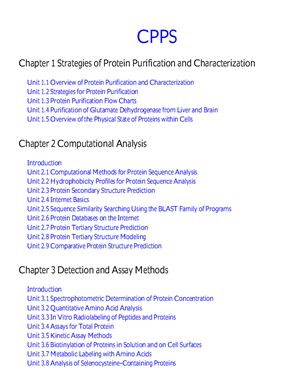Online Posting Date: August, 2001 Print Publication Date: June,
2001 Wiley InterScience 3845 p.
"Current Protocols In Protein Science" - обширнейший сборник протоколов применяемых при изучении белков. Представленные в книге методы охватывают различные аспекты изучения природы белков, от количественных характеристик полипептидов до выявления структуры, от техник очистки "диких" и рекомбинантных белков до изучения взаимодействия различных белков.
Одна из полезнейших книг для любой лаборатории, сталкивающей с изучением полипептидов. На мой взгляд, книга "Current Protocols In Protein Science" должна быть в библиотеке "белковика".
В данном файле есть гиперссылки для удобства перехода от оглавления к соответствующим темам, однако для того, чтобы они заработали нужно установить для пдф-ридера поддержку китайского (Для Adobe Acrobat: например Adobe Reader X Font Packs - Chinese Simplified).
With the mapping of the human genome, more and more researchers are exploring protein structures and functions in living organisms. Current Protocols in Protein Science provides protein scientists, biochemists, molecular biologists, geneticists, and others with the first comprehensive suite of protocols for this growing field.
Table of Contents
Chapter 1 Strategies of Protein Purification and Characterization
Chapter 2 Computational Analysis Introduction
Chapter 3 Detection and Assay Methods Introduction
Chapter 4 Extraction, Stabilization, and Concentration Introduction
Chapter 5 Production of Recombinant Proteins Introduction
Chapter 6 Purification of Recombinant Proteins Introduction
Chapter 7 Characterization of Recombinant Proteins Introduction
Chapter 8 Conventional Chromatographic Separations Introduction
Chapter 9 Affinity Purification
Chapter 10 Electrophoresis
Chapter 11 Chemical Analysis
Chapter 12 Post-Translational Modification: Glycosylation Introduction
Chapter 13 Post-Translational Modification: Phosphorylation and Phosphatases Introduction
Unit 13.9 Phosphopeptide Mapping and Identification of Phosphorylation Sites
Chapter 14 Post-Translational Modification: Specialized Applications Introduction
Chapter 15 Chemical Modification of Proteins Introduction Chapter 16 Mass Spectrometry
Chapter 17 Structural Biology
Chapter 18 Preparation and Handling of Peptides Introduction
Chapter 19 Identification of Protein Interactions Introduction
Chapter 20 Quantitation of Protein Interactions Introduction
Chapter 21 Peptidases
Chapter 22 Gel-Based Proteome Analysis Introduction
Chapter 23 Non-Gel-Based Proteome Analysis Introduction
Appendix 1 Useful Data
Appendix 2 Laboratory Guidelines, Equipment, and Stock Solutions
Appendix 3 Commonly Used Techniques
Appendix 4 Molecular Biology Techniques Molecular Biology Techniques
Appendix 5 Biophysical Methods: Data Analysis
"Current Protocols In Protein Science" - обширнейший сборник протоколов применяемых при изучении белков. Представленные в книге методы охватывают различные аспекты изучения природы белков, от количественных характеристик полипептидов до выявления структуры, от техник очистки "диких" и рекомбинантных белков до изучения взаимодействия различных белков.
Одна из полезнейших книг для любой лаборатории, сталкивающей с изучением полипептидов. На мой взгляд, книга "Current Protocols In Protein Science" должна быть в библиотеке "белковика".
В данном файле есть гиперссылки для удобства перехода от оглавления к соответствующим темам, однако для того, чтобы они заработали нужно установить для пдф-ридера поддержку китайского (Для Adobe Acrobat: например Adobe Reader X Font Packs - Chinese Simplified).
With the mapping of the human genome, more and more researchers are exploring protein structures and functions in living organisms. Current Protocols in Protein Science provides protein scientists, biochemists, molecular biologists, geneticists, and others with the first comprehensive suite of protocols for this growing field.
Table of Contents
Chapter 1 Strategies of Protein Purification and Characterization
Chapter 2 Computational Analysis Introduction
Chapter 3 Detection and Assay Methods Introduction
Chapter 4 Extraction, Stabilization, and Concentration Introduction
Chapter 5 Production of Recombinant Proteins Introduction
Chapter 6 Purification of Recombinant Proteins Introduction
Chapter 7 Characterization of Recombinant Proteins Introduction
Chapter 8 Conventional Chromatographic Separations Introduction
Chapter 9 Affinity Purification
Chapter 10 Electrophoresis
Chapter 11 Chemical Analysis
Chapter 12 Post-Translational Modification: Glycosylation Introduction
Chapter 13 Post-Translational Modification: Phosphorylation and Phosphatases Introduction
Unit 13.9 Phosphopeptide Mapping and Identification of Phosphorylation Sites
Chapter 14 Post-Translational Modification: Specialized Applications Introduction
Chapter 15 Chemical Modification of Proteins Introduction Chapter 16 Mass Spectrometry
Chapter 17 Structural Biology
Chapter 18 Preparation and Handling of Peptides Introduction
Chapter 19 Identification of Protein Interactions Introduction
Chapter 20 Quantitation of Protein Interactions Introduction
Chapter 21 Peptidases
Chapter 22 Gel-Based Proteome Analysis Introduction
Chapter 23 Non-Gel-Based Proteome Analysis Introduction
Appendix 1 Useful Data
Appendix 2 Laboratory Guidelines, Equipment, and Stock Solutions
Appendix 3 Commonly Used Techniques
Appendix 4 Molecular Biology Techniques Molecular Biology Techniques
Appendix 5 Biophysical Methods: Data Analysis

